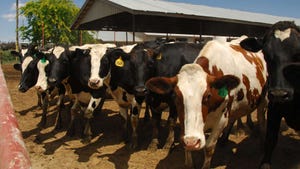Trump, Biden continue to court farmers
Renewable fuels and trade policy continue to differentiate these two candidates.

With less than three weeks to go until the election, the Midwest remains solidly in play. And each camp continues to try to refine their plan and outreach to what surged as a key constituency in the 2016 election.
A new poll out from Focus on Rural America released just hours before President Donald Trump was in Iowa speaking at the Des Moines airport showed it remains a horse race. The survey of 600 likely November 2020 voters (not distinguished as rural voters) show that voters in Iowa have moved toward President Trump, while voters in Minnesota and Wisconsin are strongly in Biden’s camp. Each state had 200 voters surveyed.
The survey shows former Vice President Joe Biden with a 50-45 lead over President Trump across these three states, with 6% saying they are undecided at this juncture. This includes 47% who say that they will definitely vote for Biden, compared with 43% who say they will definitely vote for Trump.
However, opinion differs strongly by state, with Iowa voters preferring Trump by 50-44, while Wisconsin voters prefer Biden by 53-43, and Minnesota voters prefer Biden by 52-41. Wisconsin seems to have especially firmed up for the former vice president, with 51% of Wisconsin voters saying they will definitely vote for Biden.
During Trump’s speech on Wednesday night, he went off script and shared his great affection for the farmers who have stood with him when he took on China and also didn’t want a “subsidy” from the government.
“The farmers are unbelievable, they’re the heart of this nation,” Trump said in Iowa. “They said, ‘We don’t want subsidy. I’ll never forget it.”
But earlier in Trump’s comments regarding those $28 billion in subsidies from the trade mitigation payments, Trump touted all the money he’s making farmers.
“I shouldn’t tell you this, because they don’t like this, but some of the farmers were making more money the way that I was doing than by working their @$$es off,” Trump said. “They were very, very happy. But no, we took care of our farmers, no other president is going to do that.”
But that message is not resonating with Pam Johnson, an Iowa farmer and former Republican who’s now ready to vote for former Vice President Joe Biden. While speaking on a Farm Foundation forum (click here for the YouTube recording) on Oct. 13, Johnson and former Trump ag advisor Sam Clovis offered a civil discourse on how each campaign differs on the top issues.
Johnson said the policies of the President and this administration matter and the No. 1 concern for rural America is not Wall Street but Mainstreet and the raw pain of the economic hardship resulting from the trade war with China, the gutting of the Renewable Fuels Standard and the mismanagement of the COVID crisis.
“As farmers, we want to make money from the marketplace. Now we get 40% of our income from the government, which is not sustainable, nor desired,” she said.
For Johnson, Biden has an action plan that gives her “hope” as it invests in the future of renewable energy and low carbon energy options.
In the last week, the Biden-Harris campaign has updated its rural plan in hopes of better articulating what it plans to do in rural America. The plan said Biden plans to adopt smarter trade policies, promote ethanol and the next generation of biofuels, strengthen antitrust enforcement and support beginning farmers, among other goals.
Johnson said Biden would restore global leadership on trade. She said she believes Biden will stand up to China but do it differently by working with allies and developing trade policies that work for American farmers. She said she doesn’t feel “fighting” is the best way to take on trade issues, but instead feels there are other ways to be “tough” without slapping on heavy tariffs. As a world supplier of ethanol and meat products, they’ve been held hostage through all of this.
“We’re stuck in a cycle of heavy tariffs and the government having to pay farmers to mitigate collateral damage,” Johnson said. “We can’t survive that kind of cycle. We have to get out of that. Joe Biden’s trade policy gives me more hope.”
Clovis said Trump’s approach to trade over the last four years shows that he’s willing to fight back, and not willing to give up sovereignty to do so. “We’re in a position of advantage,” he said in discussions with China. “We’ve been able to force them to deal in a much different way.”
Pam said an issue she and a lot of farmers would die on the sword for relates to actions on the Renewable Fuels Standard. This Administration’s handling could peel off lifelong Republicans as some see he’s “sold out ethanol to Big Oil,” she said. “I think we need to put the blame at the feet of President Trump. He cannot pretend he has no power over EPA.
“The RFS is law. When it is broken, it is a big deal to farmers whether you are Republican or Democrat,” she said.
While speaking in Iowa, Trump touted the actions he’s taken to support the ethanol industry, including allowing E15 year-round and using current pumps instead of requiring additional money to upgrade the pumps.
“The Biden-Harris platform will demolish Iowa ethanol, you know that, wiping out the entire industry,” Trump quipped while speaking in Des Moines.
Clovis also shared Trump supports raising octane levels which could offer a 1.17 billion bushel demand boom for ethanol.
About the Author(s)
You May Also Like



.png?width=300&auto=webp&quality=80&disable=upscale)

